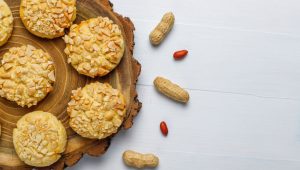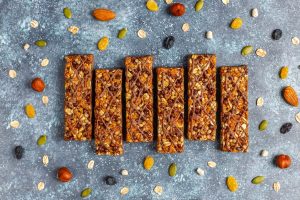Want to gain weight in a healthy way?
Peanut butter might just be what you’re looking for.
With plenty of nutrients and a burst of flavor, peanut butter is not only yummy but also works for weight gain.
In this guide, we’ll share everything you need to know about using peanut butter to gain weight safely and deliciously.
Weight Gain Dynamics
Before going into the nitty gritty of how peanut butter can help you gain weight, it’s important to understand how weight gain works so you can pack in those extra pounds without putting your health at risk.
There are 3 main areas we need to focus on.
- Caloric Surplus
Caloric surplus means eating more calories than your body burns each day.
Here’s how you can get it right:
- Calculate Your Basal Metabolic Rate (BMR): This is the number of calories your body needs to keep functioning while at rest.
- Physical Activity: Add extra calories based on how active you are throughout the day.
- Establish a Surplus: Aim to consume an additional 300-500 calories each day. This should help you gain about half a pound a week.
2. Macronutrient Balance
Another important factor in helping you gain weight the right way is finding the perfect balance of proteins, carbs, and fats. Each of these plays an important role in supporting a healthy weight gain.
- Proteins help your muscles grow and recover after workouts.
- Carbohydrates are the fuel that keeps you energized for daily activities and those intense exercise sessions.
- Fats are essential for keeping your hormones balanced, your brain sharp, and helping your body absorb all those important nutrients.
3. Healthy instead of unhealthy Weight Gain
Not all calories are created equal when it comes to gaining weight.
Choosing nutrient-packed foods that provide you essential vitamins and minerals ensures that you’re adding healthy pounds.
Think of foods that nourish your body while helping you grow stronger.
On the flip side, piling on empty calories from sugary treats and unhealthy fats can lead to unwanted fat gain and potential health issues.
Therefore, finding the right balance between tasty and healthy is a must when it comes to weight gain.
Now that we’ve covered the basics of healthy weight gain, let’s have a quick look at…
Why Peanut Butter?
I know. I know.
You probably already know why you should be using peanut butter for weight gain, but we thought to state some facts here just to help you strengthen that motivation.
So, to begin with, let’s have a look at the nutritional profile of peanut butter.
Nutritional Profile of Peanut Butter
Macronutrients
Every 2-tablespoon (32g) serving of natural peanut butter is a mix of the essential macronutrients your body needs and loves. Each serving has:
- 190 calories
- 8 grams of proteins
- 16 grams of fat, of which
- Monounsaturated fat is 8 grams
(These are heart-healthy fats which are great for your overall well-being.) - Polyunsaturated Fat is 4 grams
(These are essential fats that your body needs but can’t make on its own) - Saturated Fat is 3 grams
(Your body needs just a small amount of these for optimal health, and peanut butter keeps it low.)
- Monounsaturated fat is 8 grams
- 6-8 grams of carbohydrates, of which:
- 2-3 grams is Fibre
- 1-2 grams are sugars
Vitamins and Minerals
Peanut butter is a treasure trove of essential vitamins and minerals that keep your body running smoothly. Here’s a list of all the vitamins and minerals packed in this natural goodness:
- Vitamin E:
An antioxidant powerhouse that shields your cells from damage, keeping you vibrant and healthy. - Magnesium:
Important for muscle and nerve function, helping you stay strong and energized throughout the day. - Potassium:
Maintains fluid balance and supports muscle contractions, making it perfect for your active lifestyle. - Vitamin B6:
Increases your metabolism and supports brain development, making sure everything in your body runs like clockwork. - Niacin (Vitamin B3):
Keeps your digestive system, skin, and nerves healthy, so you feel your best inside and out. - Folate:
Essential for DNA synthesis and repair, playing a key role in your body’s growth and maintenance.
Antioxidants and Phytochemicals
What? You thought that was all?
Well, you’re in for a surprise then.
Peanut butter is also packed with antioxidants and beneficial plant compounds. Here’s the list:
- Resveratrol:
Linked to heart health and anti-aging benefits, helping you stay youthful and active. - Flavonoids:
Fight off oxidative stress and reduce inflammation, promoting overall health and resilience.
So, this was a detailed nutritional profile of peanut butter. It sure is more than just a calorie-packing snack.
Below are a few benefits of adding this delicious spread to your regular diet:
Benefits of Peanut Butter for Weight Gain
- High-Calorie Density
Just a couple of tablespoons can kick up your energy without making you feel overly full. This makes it super easy to increase your daily calorie intake without having to eat huge portions. - Protein-Rich
Peanut butter contains 8 grams of protein per serving. This makes it great for muscle growth and recovery, especially when paired with your strength training routine. - Healthy Fats
Peanut butter is packed with monounsaturated and polyunsaturated fats that are great for your heart and overall health. These fats support various bodily functions while providing the energy you need throughout the day. The best part is that the saturated fat content is low, so you get the benefits without the excess. - Nutrient-Dense
Peanut butter has plenty of essential vitamins, minerals, and antioxidants that keep your body nourished as you gain weight. - Versatility
Whether you’re spreading it on toast, blending it into smoothies, or adding it to your favorite recipes, peanut butter fits seamlessly into any meal or snack. It’s an awesome way to enhance both the flavor and nutritional value of any meal. - Satiety
With a mix of protein, fats, and fiber, peanut butter keeps you feeling full and satisfied longer. This means you’re less likely to reach for unhealthy snacks between meals and more likely to stick to consistent, healthy eating on your weight gain journey.
That’s a bunch of benefits!
Let’s now see how you can add this super healthy and delicious treat to your meals.
Incorporating Peanut Butter into Your Diet
Incorporating peanut butter into your diet needs a bit of planning. You need to stay in caloric surplus along with spreading it across different meals of the day.
Start by thinking about what you’ll eat and snack on throughout the day.
Try to include peanut butter in different meals like breakfast, lunch, dinner, and snacks. This will help you get extra calories and good nutrients without any hassle.
Here are some ideas:
- Breakfast Ideas
Kickstart your day with these tasty peanut butter breakfast options that are both healthy and delicious:
- Smoothies
Add 2 tablespoons of peanut butter to your morning smoothie to make it creamier and get a calorie boost to start your day strong.
- Oatmeal
Mix a spoonful of peanut butter into your everyday oatmeal or cereal. It not only makes your breakfast taste better but also adds protein and healthy fats.
- Toast
Spread peanut butter on a slice of toast. Top it with banana slices, a drizzle of honey, or a sprinkle of chia seeds. It’s a quick, tasty, and satisfying breakfast that keeps you energized longer.
- Peanut Butter Pancakes
Stir peanut butter directly into your pancake batter for a nutty flavor and extra calories.
Snack Options
- Fruit Pairings
Dip apple or banana slices into peanut butter for a sweet and savory combo that will keep you energized and full.
- Energy Balls
Need a quick snack? Mix peanut butter with oats, honey, nuts and dried fruit. Roll into balls and keep them in your pocket for a quick energy fix on the go.
- Nut Butter Sandwiches
Spread peanut butter on whole grain bread and get creative with jelly or honey. It’s easy and filling.
Lunch and Dinner
- Sandwiches and Wraps
Spread peanut butter in your sandwiches or wraps. With chicken and crunchy veggies.
- Sauces and Dressings
Add to sauces for stir-fries, salads or noodle dishes for extra flavour.
- Baking
Add a tablespoon of peanut butter to muffins, protein bars or bread for extra calories, nutrients and flavor.
Desserts
- Peanut Butter Cookies
Add some peanut butter to your cookie batter for a sweet calorie hit.
- Frozen Treats
Blend some peanut butter with yogurt and freeze for a high calorie frozen dessert.
Beverages and Smoothies
- Peanut Butter Milkshake
Blend peanut butter with ice cream, milk and a sweetener of your choice.
- Protein Shakes
Mix with protein powder, milk and a banana for a post workout drink.
Those are some delicious ways to add peanut butter to your diet.
But with such yummilicious ideas, it’s easy to get off-track and sometimes over-indulge.
Even if you’re trying to gain weight.
That’s why it’s important to understand portion control and track your caloric intake.
Portion Control and Caloric Intake
Gaining weight without gaining fat involves managing your portions and caloric intake.
The first step is to calculate your daily caloric needs based on your Basal Metabolic Rate (BMR) and activity level.
Use online calculators or consult a nutritionist to work out your daily caloric needs to maintain your weight and then add a surplus for weight gain.
Next, use a food diary or apps like MyFitnessPal to track your daily calorie and nutrient intake.
This will ensure you’re in a caloric surplus every day and help you identify areas to adjust.
Once you know how many daily calories you need to intake, and how much of a surplus you must establish for a healthy and sustained weight gain, peanut butter can be one of the most helpful things in your journey.
To make the best use of peanut butter goals, make sure to keep the following pointers in mind.
How to Get the Maximum Benefit from Peanut Butter In Your Weight Gain Journey
- Buy Quality: Go for natural or organic peanut butter with few ingredients.
- Measure Portions: Stick to the serving size of 2 tablespoons.
- Pair with Nutrient Dense Foods: Eat peanut butter with natural foods such as whole grains, fruits, vegetables and lean proteins.
- Use in Meals: Use peanut butter as part of a meal not as a meal replacement..
- Stay Hydrated: Drink plenty of water.
- Work Out: Strength train to gain muscle mass instead of fat.
- Consistency: Maintain a consistent dietary routine to stay in calorie surplus.
So, there you have it.
A quick guide on using peanut butter to gain weight.
What are some of the other things that are helping you in your healthy weight gain journey?
Let us know in the comments!




